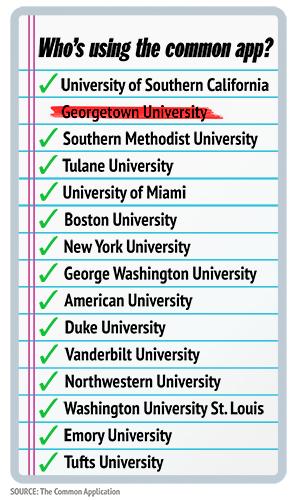GW is really trying to get to know the Class of 2020.
GW changed two questions in its short essay section of the Common Application this fall, which officials said was a way for GW to determine how prospective students could contribute to and fit in at the University. Experts said though students may consider additional application questions to be busy work, they’re important indicators that a student is legitimately interested in attending.
One of the new questions asks prospective students to discuss an experience outside of the classroom, which Dean of Admissions Karen Stroud Felton said could range from working a part-time job to playing an instrument.
“Anything a student does when not sleeping or studying is important,” she said. “Every activity helps to develop skills and contributes to a student learning about who they are and what they want to achieve.”
The other new question asks applicants to “reflect on a significant challenge” in high school and write about a person “who provides support, advice and wisdom to you in times of difficulty.”
Felton said that question will help admissions staff determine how prepared a student is to undertake work at the college level.
“Research indicates that a willingness to seek and take advantage of a strong support person or network during times of crisis is important to a student’s academic success,” she said. “These questions enable us to demonstrate to prospective students that we want to get to know them.”
Last year, GW changed its application to allow students to apply to multiple schools within the University and to select one of the three essay questions, which experts said could help to bring in a larger applicant pool. Officials admitted 45 percent of applicants this fall, the highest acceptance rate in a decade.
This year, officials cut a question from last year’s application that asked applicants what they would ask George Washington at a dinner party, and another that asked applicants how they would “make their own” history at GW, falling in line with the theme of the University’s $1 billion campaign.
Felton said officials changed the prompts this year after the University implemented its test-optional policy in July. Schools can change their short essay questions on the Common Application each admissions cycle.
Officials said the switch to a test-optional policy was a way to encourage underrepresented students to apply. But some experts said at the time that the shift did not necessarily mean the Class of 2020 would be more racially or socioeconomically diverse.
Karen Spencer, the former assistant director of admissions at Georgetown University who now works as a college consultant at the advising group College Coach, said the addition of the second question on a challenge and a mentor surprised her. She said some schools have nixed questions about mentors from their applications because students tend to write “odes to grandma or biology teacher.”
“I am curious and a little surprised, frankly, that this is one question,” she said. “You can say why this person is interesting and what this says about you, but it’s not [necessarily] about the person applying.”
Spencer said the essay portion of the application is important to admissions offices because a student can prove that he or she has visited campus and are especially interested in the school.
“There’s a lot of overlap in the D.C. schools in terms of applications,” she said. “If I put my thumb over GW’s name, could I write about another school?”
Officials decided to exclusively use the Common Application two years ago. Applicants must now pay $75 to apply, which officials hoped would deter applicants who were less than enthusiastic about GW.
Schools that use only Common Application to weed through prospective students also pay less per application, Examiner reported in 2013. Georgetown University is the only one of GW’s 14 peer schools that does not exclusively use the Common Application.
Elizabeth Benedict, the author of “Don’t Sweat the Essay,” a book which aims to help those applying to college navigate the process, said some admissions offices add questions to their applications to gauge how serious applicants are because the Common Application makes it easy to apply to a dozen or more schools.
“Yes, the questions ask students to reflect on their lives, and they might elicit the level of someone’s maturity, and that might be useful information – but I can also read the questions as potential busywork, and maybe an impediment if you’re not really interested in GW,” she said.







